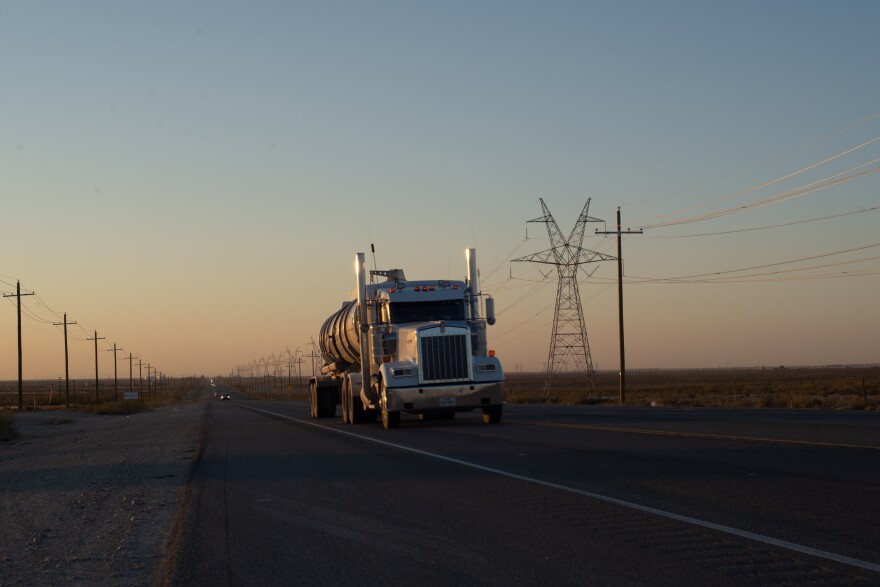In the past few weeks, the West Texas oil patch has been rocked by two 5.4 magnitude earthquakes that were among the largest in the state’s recorded history. People reported feeling the quakes hours away in big cities.
In November, one of the quakes hit near the small town of Orla, where big rigs barrel up and down the highway every day, hauling everything from oil and gas to water and sand. The region is one of the most active parts of the Permian Basin oilfield, and it’s where a lot of Permian drilling activity has been centered in recent years.
This far-flung corner of the state has also lately been a hotbed of earthquakes.
At the Armadillo Hotel in Orla, a dusty lot with rows of trailers where roughnecks sleep between shifts, Angeles Ajuntas said she felt last month’s big quake. She’s worked here for a year, she said, and the quake centered just a few miles away was the first one she’s noticed.
“I was more shocked,” she said. “I was like, ‘I didn’t think we could get them here,’ and then I had my coworkers tell me, ‘Oh yeah, you’ll get used to it.’”
This region has seen a flurry of smaller quakes over the past few years that don’t always noticeably shake the ground.
“2017, 2018 is when things started really ramping up exponentially,” said Robert Skoumal, a seismicity expert with the U.S. Geological Survey who has studied the quakes.
Skoumal’s research has shown that the vast majority of these quakes have been triggered by oil companies pumping wastewater from the drilling process into the ground. Skoumal explained how exactly it happens:
“The activities are not shaking the ground,” he said. “It’s more changing the stresses that are acting on these faults, and those stresses, in turn, cause these faults to slip, which then cause the shaking.”
This year alone — in the county where last month’s big earthquake happened — companies have pumped more than 49 billion gallons of wastewater into the ground, according to data compiled by the analyst firm Rystad Energy.
“It’s an insane amount of water,” said Rystad’s Ryan Hassler, who noted that oilfield quakes aren’t new.
Oklahoma saw a flurry of earthquake activity at the dawn of the fracking boom, a trend that was later repeated in North Texas when drilling picked up there. But these days in West Texas, Hassler said, there is just a lot more wastewater that comes along with drilling.
“You’re talking about anywhere between a 3:1 to a 6:1 barrel of water to barrel of oil recovery in these wells,” he said. “The wells have gotten bigger, so with that we’re seeing more [oil] production, but we’re also seeing a lot more water production.”
The response from regulators at the Texas Railroad Commission, which regulates fossil fuels, not railroads, is notably different now, too.
When scientists noted the link between quakes and oil and gas less than a decade ago, regulators were initially skeptical. They’ve since embraced the science and even acknowledged that there is a link between industry and earthquakes.
“The Railroad Commission has been significantly aggressive in curtailing activity,” said Todd Staples, head of the trade group Texas Oil and Gas Association.
Regulators’ actions on the matter have led to “serious financial consequences” for companies in the area, Staples added.
And regulators are still investigating the recent near-record quakes. In some parts of West Texas, they’ve taken direct action to shut down wastewater disposal sites. But around Orla, near the big one in November, they’re mostly relying on promises and plans developed by the oil companies themselves.
Staples said the industry knows more shutdowns could happen if the quakes don’t slow down, but critics argue officials could be more aggressive now.
“I think it shows that the commission is really reliant on the industry to police itself,” said Virginia Palacios with Commission Shift, a sort of watchdog group focused on the Railroad Commission.
Regulators have outlined goals for reducing earthquakes within the next two years. In the meantime, Angeles Ajuntas at the Orla Hotel said she’s not too worried about the quakes.
“But it’s like, also concerning because you don’t know what else can happen,” she said.
For now, earthquakes are just a fact of life in the oil patch.
This story originally aired on Dec. 28, 2022 on Marketplace.


